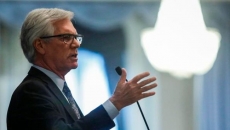The killing of four members of a Muslim family in London, Ont., on Sunday has been denounced as an act of terrorism by Prime Minister Justin Trudeau, but it's possible the terrorism label will never be reflected in the charges faced by the accused.
Legal experts say it's probably too early for terror charges to be laid because investigators need sufficient evidence of motive. But the experts also expressed concern that prosecutors in Canada usually reserve terror charges for people with Islamist extremist views, which they say sends the message the law isn't being applied equally.
Leah West, a professor at Carleton University's Norman Paterson School of International Affairs who studies national security law, said terrorism charges could still be added in the London attack. A 20-year-old London, Ont., man is currently charged with four counts of first-degree murder and one of attempted murder.
"It may not have been immediately apparent that the violence was motivated by ideology, politics or religion, or immediately apparent that the intent of the accused was to create fear or intimidate a segment of the population," she said in an interview Tuesday. "And you need both of those elements, on top of serious violence, for terrorism."
On Sunday, four members of a Muslim family were killed in London, Ont., when a man allegedly drove his pickup truck into them while they were out for a walk. A nine-year-old boy was injured but survived. Police have said the victims were targeted because of their Muslim faith. After the House of Commons observed a moment of silence for the victims on Tuesday, Trudeau called the assault "a terrorist attack, motivated by hatred."
Michael Nesbitt, a law professor at the University of Calgary, said it would be unprecedented for terror charges to be brought this quickly after an arrest, adding that Canada's terrorism laws are primarily aimed at preventing terrorist attacks. "We only have two examples of cases where someone has committed murder and they have also been charged with terrorism," he said.
One case involved a 17-year-old Toronto man alleged to have killed one woman and injured another in a 2020 attack that prosecutors believe was motivated by the "incel" movement, which the Canadian Security Intelligence Service defines as a type of "violent misogyny." Terror charges were laid several months after the attack. The other case was a 2020 hammer attack by a 30-year-old Toronto man that left a woman dead.
West said prosecutors sometimes decide not to lay terror charges because of the additional burden of proving motive — something lawyers rarely have to do. With first-degree murder carrying the same sentence regardless of whether it was an act of terror, prosecutors may decide terror charges aren't worth the additional effort, she added.
West, who has worked as a national security litigation lawyer in the federal Justice Department, said prosecutors should be open to laying terrorism charges because of the importance of denouncing certain acts.
"We need to denounce terrorism when it is terrorism, no matter who the perpetrators or victims are, and it has not been applied equally or equitably in the past," she said, adding that she worries about the prime minister using the term "terrorist attack" when prosecutors still need to make an independent decision.
Kent Roach, a law professor at the University of Toronto, said prosecutors can charge someone withfirst-degree murder as a planned and deliberate homicide and murder by way of terrorist activity — charges he said prosecutors should have laid in the 2017 Quebec City mosque shooting that left six dead. In that case, prosecutors did not lay terrorism charges.
"There's nothing that prevents the Crown from charging … planned and deliberate and terrorist activity, and if at the end of the day, the judge and the jury have a reasonable doubt about terrorist activity, so be it," he said in an interview Tuesday.
Yusuf Faqari, the Quebec director of public affairs for the National Council of Canadian Muslims, said labelling the killings a terrorist attack could help prevent further killings.
"These poor Canadians of Islamic origin lost their lives because of the faith that they practise," he said in an interview Tuesday. "What else do we need more there to call it what it is? It needs to be called a terrorist attack so it prevents other tragedies."
Nesbitt said that since Canada's terrorism laws were introduced 20 years ago, they've mostly been used to prosecute members of organized Islamist extremist groups. "If you only have one threat, and you're only prosecuting one threat, then that's not a problem," he said. "But all evidence we have suggests that there are multiple threats, including ones that have not been prosecuted for terrorism until the past year, maybe."
That's a concern for Roach as well, who points to the fact that Justin Bourque, who killed three RCMP officers in 2014, and Quebec City mosque shooter Alexandre Bissonnette were not charged with terrorism.
"I think police and prosecutors need to accept that this far-right extremism now is a serious threat," he said.






